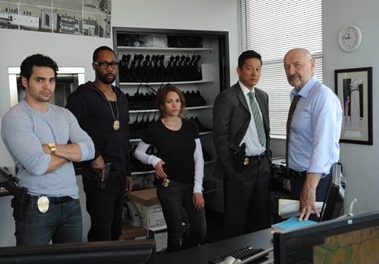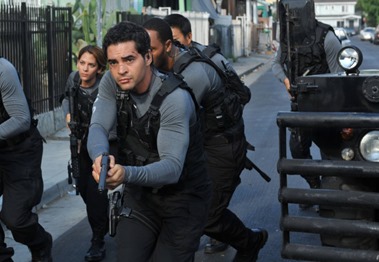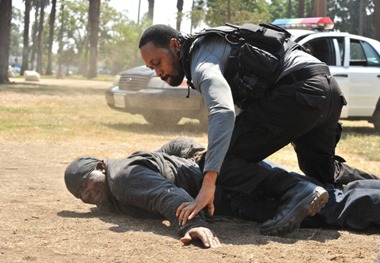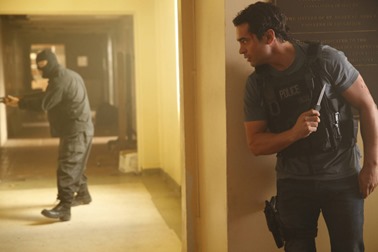Fox’s new series, Gang Related (Thursdays, 9/8C) premieres this week. It was created by Chris Morgan (Wanted, Fast & Furious: Tokyo Drift, F&F 6&7); the pilot was directed by Allen Hughes (From Hell, Touching Evil), and the showrunner is Scott Rosenbaum (Con Air, High Fidelity). The three have set up what they hope is a fresh, distinctive tale of a ‘rising star’ on the LAPD’s Gang Task Force – who is a mole for a gang, but is having second thoughts.
Recently the three sat down with a group of bloggers/journalists to talk about where the show came from, it’s complex characters and where it might be going.
Hi, guys. Thanks for doing the call today. Can you both talk about how you got started working on the show. And then, Chris, how you came up with the idea and everything.
Chris Morgan: This is Chris. I’m happy to jump in on where the idea came from and then, Scott, if you want to follow up about the show, but basically I had seen – I’ll give you the very short version – I saw a police video one time of a man – they were responding to a man with a gun call, and the police show up. It was a dash cam video and the guy with the gun actually has an AK-47 and he begins to engage the police, and additional police cars show up and they can’t touch this guy. The reason why is, breaking down the video later, they realize this guy was a gang member and on top of it, he was sent into the military to become a better soldier to come back and fight on the streets.
Seeing that just made me think, wow, if the gangs have become so sophisticated that they are actually now dividing and making a hierarchy and specializing in certain things, what else would they be into. That just started getting the ball rolling on, well, what if there was a gang task force and the guy who’s leading it is, unbeknown to the police, is actually a member of the gang working to inform for them. That’s the genesis of where that came from.
Scott Rosenbaum: I guess I’ll just jump in. It’s Scott. Chris had written the pilot and it got picked up, and they were looking for a show runner to work with Chris and so I got a phone call from the studio, saying that they had the script that they loved and have been picked up and gave me sort of a description of it and said, would you read it and see if it would be something you’d be interested in. That’s how I got introduced to the show when I read the script and I really thought it was an amazing pilot script.
Oftentimes, I don’t really – a pilot script is where the series can go. So not only was it a great pilot script, but I thought that the conflicts in the world that have been set up in the pilot were ones that were really uniquely interesting to me, specifically the Acosta family and the desire to get out, and, obviously, Ryan’s strong bonds with this family who, as an orphan, brought him up and then suddenly he’s working for the police and sort of how his moral compass us is being developed and maneuvered and what that’s doing to him professionally and personally. I met with Chris and we talked about a lot about the show. He, actually, was a fan of The Shield, so we had a lot stuff about that show that we could talk about and then that sort of, we decided we would work together on it. That’s how I got involved.
Chris, I was wondering you have a show like this that has a lot of violence of all different sorts, how do you figure out where to draw the line where it becomes too much for the audience?
Chris: Great question. It’s very interesting. I think my job isn’t so much, and frankly all of our jobs on this, isn’t exactly where to draw the line because there is a very healthy S&P, standards and practices, that will draw that line for you. Our job is to push it to the point where, especially with a show like this, because I think the level of the moral questions involved have to be a little bit darker and a little bit deeper and the violence involved has to hit home a little bit harder to underscore Ryan’s dilemma and just what’s at stake.
Our job is to push it and wait until we get a little bit of pushback. I think we have generally an idea of what we can do for network TV, but the goal really for this show is to bring a cable, darker, little bit more edgy feel and kind of to push the boundaries of network television a little bit.
Great. When a show comes this late in the season, I guess they call it a mid-season show, it’s kind of late, do you think there are more or fewer expectations in terms of whether Fox is going to pick it up for more episodes?
Chris: My gut on that is, I think the landscape of TV is changing, particularly at Fox. I’m most concerned about the time of it, especially nowadays, since we live in a world of – it’ s not as much appointment television as it is to set your DVR to be able to watch when you like. I think whether you get picked up, or whether you don’t has less to do with the time of year and more to do with the content, so all I can do is control the contents, and I think we have a great, kind of edge of your seat, like twisty, turny show with some really good character moments and character changes. So I would rather play all off offensive on story, and the fact of the matter is, we have excellent direction and excellent actors. The stories are incredible. We are just going to swing for the fences and hope the audience responds.
I saw the pilot. I enjoyed it. Is it barely possible (dog barking) – my dog, I’m sorry.
Chris: What kind of dog is that, by the way?
Scott: I have two dogs, too. What kind of dog is it?
It’s a little Chihuahua and he is my office buddy.
Chris: I have a 19-year-old Chihuahua, just so you know.
Good for you. They last forever. I had a 17-year-old. We lost him recently.
Chris: I’m sorry to hear that.
After 17 years, there’s a little love in there.
Chris: Pretty good.
Anyway, she’s through with her question – is it barely possible that any of the main actors on the show have been in this kind of gang world, or even near it, and maybe got out somehow that maybe somebody in the cast might have a level of expertise and experience beyond just doing a ride-along and that kind of level of research?
Chris: We actually have several. Emilio Rivera, who plays our Tio Gordo character, he was involved in his youth, and he brings the very real credibility and honesty to the role and to the world. He is a great resource to us. He’ll always step up and say, “This doesn’t sound like someone would say it. I don’t think someone would do this kind of move,” so he’s someone we really used and treasure for that.
Frankly, Jay Hernandez grew up in that neighborhood, and he has siblings who would go a different path than him, so I think all of them, in their way, and, frankly, Ramon has friends – all of them brought a familiarity from the world that they grew up in. I think that’s what also resonates about the show, by the way, is the fact that we really do try to get into why gangs exist and why you would join a gang. There’s all the negative, too, which is the violence and all that as well, but, also, if you look at the history of gangs, the truth of the matter is – typically gangs started when people would come over. They were disenfranchised. They couldn’t get a legitimate start. They would bond together in these clicks, and, frankly, the only way you could feed your kid was to – sometimes it was violence and sometimes it was other things.
But the truth of the matter is, when those groups were together, they were family. And so what we want to do is present this world where not only is it the negative and the dark side, which is completely true, but also why would our lead, who is – when you pick up our lead in this show, we’re picking him up at a very specific time in his life which is his entire life he’s been raised by this gang. They’ve acted as a family to him. It’s the only family he’s ever known. He loves the people involved there, even though they do bad things. But now he’s a cop as well, and when we pick him up in the pilot, an event occurs and now he’s torn for the first time in his life. He likes being a cop. He likes being someone who goes out and does good things in the world, but he also loves his family and wants to take care of them as well, so that’s really what this show is is kind of are you who you have been your whole life or are you who you want to be.
Frankly, the truth of the matter is, we really want to get under the skin of everybody and really exploit the fact that in every hero, there’s a darkness. And in every villain, there is something heroic as well. People are less than just black and white. They are grey and they are messy. That’s kind of the gauntlet we want to run all our characters through.
My question was for Chris. I was wondering – you wrote several of the Fast and Furious movies and they have this kind of gritty edge but they’re also really fun, too. Can we expect a similar tone from Gang Related?
Chris: Definitely. I think – what I love about Fast more than anything, besides the action and the cars, it really is how these characters bond. Whether they’re good guys or bad guys, they have a code and there’s a brotherhood to everybody. I think just a natural part of that is guys busting on each other and women busting on each other. It’s how this group fits together and works like a family. It’s siblings that fight and I think that’s where a lot of the fun that the Fast franchise comes from.
That’s exactly what we’ll be doing with our cast on this. The cops have their own –
Allen Hughes: I’m sorry. [Indiscernible] They just dropped me in. Go ahead. I’m sorry.
Chris: Oh, no problem. The cops will certainly have their fun and the gang side will have their own version of that as well, but, frankly, these are characters you’re going to want to spend time with. That means you have to have moments of levity and fun. Anything you want to add to that, Scott?
Scott: No. I think you covered it really well. It’s great.
Allen: Hey, Scott. Hey, Chris.
Chris: Hi Allen, my man. How are you my man?
Allen: I’m good. I just had to poach myself but I’m good now.
Chris: Beautiful.
Allen: I’m sorry about the tardiness.
Chris: No worries. The amazing Allen Hughes has joined the call.
Thanks so much for taking time out to speak with us today. I’m kind of curious – I saw the pilot episode and I was kind of curious – I know you that guys discussed it a little bit, but where the idea came from and how you can piece together and what fans can expect for the rest of the season as the rest of the episodes start airing – like where you’re going to go from there because it seems like there’s so many open-ending angles just within the pilot episode.
Scott: Chris, do you want to answer that to start with where the idea came from?
Chris: No, you jump in.
Scott: Well, do you want to answer the part about where the idea came from?
Chris: You heard that answer but it’s basically the idea – I don’t want to cover old ground for you, but basically the idea came from a police dash cam video and – I mean, I guess I’ll just run through it really quick.
Basically it came from a police dash cam video of police officers responding to a man with a gun call. So the cops show up and they’re confronted by a guy with an AK-47, and the cops, as good as they are and even though they vastly outnumbered him, they could not get in to stop this guy. And when they reviewed the video later, this guy ended up – they looked and he was using a military technique called slicing the pie, which is he barely exposes himself and he opens a wider field of fire and he becomes a really hard target. What they deduced from that was this was gang member who was sent by his gang into the military to become a real fighter for the street – an enforcer.
That made me start thinking if they’re sending people into the military, where else would gangs be sending people. The world has changed, and they are becoming very sophisticated organizations – what else are they sending people into. The idea was that Los Angeles has a gang task force. What if the guy who is one of the super stars in the task force, unbeknownst to his teammates, is actually a gang member who is informing for his gang?
When we pick him up, he’s at this moment in his life where he’s conflicted for the first time about what he’s doing. Just speaking to the world and all that – can I just tell you what I love about the show? I think there’s a great, large world here. In fact, our show does something that no other show I’ve seen, or at least that I can think of right now, does. We have one episode coming up in mid-season where we have four huge dramatic scenes – very long dramatic sequences between characters, back, to back, to back, to back. The first one is in English. The second one is in Spanish. The third one’s in Korean and the fourth one’s in Russian. Our world is being able to take Los Angeles, and I think Allen did an incredible job with this, like showing L.A. as people who live here know it and all these communities that are certain sections of town that we now get to go into and get separate avenues of story from that no other TV show is able to do. On some level, that reminds me a lot of one of my very favorite shows, which is Game with Thrones. You have these different kingdoms that have different rules and different leaders, and our guys are the one group that have to travel between it to understand those rules. And each kingdom has its own goals but the turf is limited. It’s called Los Angeles.
So I think there are – and not only that, not only do you have the element of the police, but the fact of the matter is, you have our personal stories with each of these task force members, as well as the gang members, and when we get to start getting it and showing how they came up where they came from, each of our characters has a dark secret, something shocking that we get to reveal over the course of the season, that’s where you get to really expand the story and get that delicious dark, cabley, fun story telling.
Allen: I want to see that show.
Just to elaborate, when I was watching the first episode, every second of it, I go, oh, all right, so he’s totally on this side. And then I’m like, oh wait, maybe not. Oh wait, what’s going on. And you guys did this great job of bouncing out between like what was going to happen and what you thought was going to happen didn’t happen. There were so many twists and turns in it. Is that what’s going to continue throughout the season? Was that difficult to try to come up with ideas to keep that going where you never really know what to expect as the episodes go on?
Chris: That’s exactly the goal.
My mind was blown by the end of the pilot. I feel like I went up and down the entire time. I had no idea – like so many things as they were happening. So I’m like how are they going to do this all season.
Allen: I could comment on that because that one is a trip for me. This is Allen talking. And Scott and Chris, what’s up baby?
Chris: How are you doing, man?
Allen: The script, obviously, was just already amazing and the team was amazing. Scott was amazing. We all were on set as well as Francie Calfo from Imagine Entertainment, and I found what was most difficult, and I never had this challenge in my career was Ramon’s job of doing what you just said – it’s on the page. But just because it’s on the page – how do you play that?
Right.
Allen: He has to do several things. He has to be this way with his family and this way with this family, and he’s got to be revealing to the audience something within that, too. So there’s several layers for an actor where he’s constantly got to be appearing or disappearing or reappearing – he’s an allusion at all times. And for an actor, for Ramon, I remember, it took all of our eyes – and it was on the page. It was written on the page, but once you get three dimensions – it’s really flesh. You’re dealing with real people and talent and you’re shooting. I think Ramon did a remarkable job. There’s a beauty and an edge and a pain in him innately, anyway, and an intellect that’s profound. I think that even with all his gifts, it took us all to watch every Michael moment to make sure that what you’re talking about was pulled off, and that was the most difficult challenge I thought.
Scott: You bring up a really good point, Allen, which is – we’ve said it to Ramon a lot, which is he has the most difficult acting job if you really drill down on it. Because, you’re absolutely right – in every scene he’s only revealing to the audience what he’s really feeling, but everybody else there’s a veneer that’s on top of it that he has to deliver. It’s really, really difficult. I think you did an excellent job getting him – helping him out with it. That was awesome.
Allen: I’m not a smoke-blower – but it took us all, and so to your questions, it’s like it took a village to pull that off. From the season and with the guys who went on with Ramon, and I heard stories – you don’t see this on television. You don’t see that on television, not even on cable television.
That’s like [indiscernible]. I’m sure there are other people with questions, but just, Allen, I know that you directed the pilot episode, and, to me, when I first watched it – I remember hearing about it. You know, you read about it and you’re like, all right, let’s see. The way it was filmed was like amazing. I was like this guy has to be a filmmaker because it was very cinematic and I felt like I was watching a movie. It was like, oh my God, what’s next as it was going on. I remember looking you up and researching and seeing all the stuff and that you have a filmmaking background. So how did that influence you for putting it on a smaller screen? Does it make a difference or is it the same process?
Allen: There’s no sense in doing it if we’re not doing cinema. Scott made that clear. Chris made that clear to me when they hired me. They said we’re not trying to make any regular television show. One, we want to do something different. We want to elevate it. We want it to be cinematic, and we want it to have – be visceral, have energy, have a sound on the field. These are mandates before I even came on to the project.
To tell you the truth, I’ve done several features, and I’ve never been auditioned and had more meetings to get a job [indiscernible]. They were very clear about what they were looking for and that made it easy for me because I’m just a cinema guy and you guys want me to do cinema on television, oh, that’s just 1-2-3, let’s do it.
But there are lenses. There are special lenses and I wonder why – when I say lenses for the laymen – just like literally lenses that you put on the camera and you go, why don’t they use these lenses in television. These are the same lenses that Tony Scott shoots with. These are the same lenses that David Fincher shoots with. These are the same lenses that David Lean shot with, and they just don’t shoot television with those lenses.
Now in series, I’ve seen a lot of stuff – there are far more talented shooters on the show in the following 12 episodes who are what we would call shooters and they come up with better shots. They’re just far more gifted to me in that department.
Scott: What are you talking about? You’re being very humble.
Allen: I’ve seen it. Mine’s a little more elementary and it’s an old-school just analogue of old-school lenses.
I disagree with that, by the way. The pilot episode kind of sets – I mean, I haven’t seen the next episode, obviously, yet, but it kind of sets the tone, so I disagree with you, but go ahead.
Allen: I’ll let you win that one. It’s that elementary, I think.
Chris: Thank you, guys.
Scott: Thanks, everyone.
Allen: Thank you so much.
Photos by Greg Gayne, , Richard Foreman and Ron Jaffe/Courtesy of Fox



